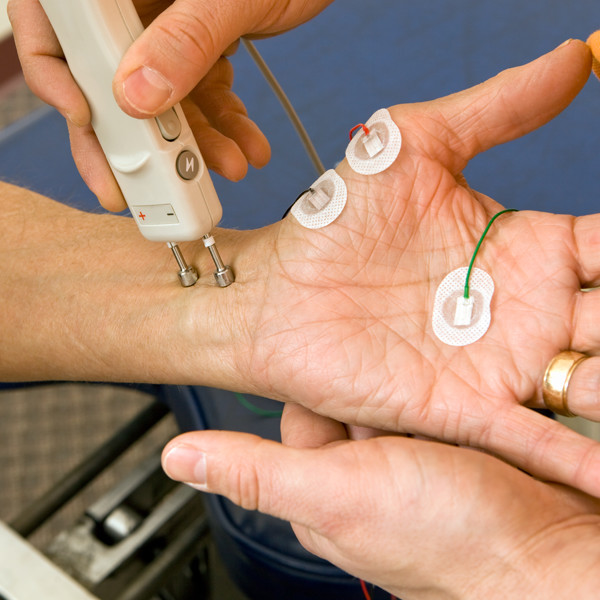Learn more about the many physical medicine tools and rehabilitation procedures we have to treat your pain.

Listening to you. It’s the first and most important service we offer.

We use the most advanced tools to arrive at a proper diagnosis.

Eliminate pain and gain strength, flexibility and mobility with our hands-on therapists.

Get relief and avoid surgery through cutting edge, minimally invasive procedures.
The first and most important procedure we perform is listening to you. We take the time to conduct a detailed medical history and by listening to you explain where it hurts, when and how we gain important insights. We pair that with a physical examination to further pinpoint and confirm a proper diagnosis. Occasionally, we conduct other diagnostic procedures, such as Electromyography to identify specific muscles or nerve groups that may be involved. But everything begins with this first and most important step of listening carefully to what you have to say.
Electromyography (EMG) is a diagnostic procedure that measures voltage and electric current to locate and gauge the extent of injury or damage to muscles and nerves in the body. The results of an EMG are used to develop a customized plan that provides relief and treats the underlying cause of pain.
Epidural Steroid Injections (ESIs) are used to treat pain in the neck, back and legs. The procedure provides relief – it doesn’t actually treat any underlying conditions. So it is most often used in combination with other appropriate treatments, such as physical therapy, that provide longer-term treatment of an injury or chronic condition.
Facet Joint Blocks (or Injections) and Selective Nerve Root Blocks (or Injections) are used primarily to isolate and determine the exact nerve or nerve groups that are the source of pain. A local anesthetic and steroid are injected either directly into a specific nerve root, or directly into the facet joints of the spine. These injections are also used therapeutically to treat pain temporarily, making it possible to perform things like physical therapy comfortably and daily living tasks comfortably.
Radio Frequency Neurotomy, also called Radio Frequency Ablation, uses heat generated by radio waves to provide temporary relief to neck and back pain, usually in patients who have not responded to more conservative pain and rehabilitation treatments, such as physical therapy.
A Ganglion Impar (Coccyx) Block may be used to diagnose or treat pain in the lower back. Single and occasionally multiple treatments are used. As a treatment, the procedure can eliminate or significantly reduce pain. Diagnostically, the procedure may be used to isolate and confirm that the source of pain has been properly identified.
Lumbar Discography is a diagnostic procedure. It is used to determine if, and to what extent, the soft spongy discs between vertebrae have been damaged. Based on the results of this procedure, the source of pain can be identified and a proper treatment plan can begin.
Spinal Cord Stimulation (SCS) is an advanced procedure used in the treatment of persistent, chronic back or neck pain that has not responded to less aggressive treatments. A small battery-powered device is implanted in the body attached to with patients who have chronic back or neck pain that have not found relief from other treatments, including surgery. SCS does not work for every patient, but many report achieving 50-70% decrease in pain and are able to decrease or even stop taking painkillers and other medications. Soft, thin wires are inserted into the back near the spinal column and are attached to a small, portable, battery-powered device that generates gentle electrical impulses. These impulses block the brain’s ability to sense pain in the targeted areas.
Trigger Point Injections are used to treat muscle spasms and knots, often in the upper back and behind the shoulders. Spasms and knots related to minor injury or trauma may be resolved with a single treatment.
Physical Therapy (PT) is the treatment of disease or injury by physical methods such as massage, heat or cold treatment, ultrasound, electrical stimulation or exercise rather than by drugs or surgery. PT is often used to help patient avoid – and also recover from – surgery. It is also used in combination with many of the other treatments and procedures we provide. PT almost always includes appropriate forms of stretching and strengthening exercises.
Endoscopic Discectomy is a minimally invasive technique for treating herniated, ruptured or degenerative discs in the spine. Using a very small incision, muscle and tissue are pulled out of the way, rather than cut, which leads to faster recovery and less postoperative pain. An endoscope (a highly specialized camera) is inserted and allows for the removal of portions of the affected disc, rather than removal of the entire disc. Typically, physical therapy is part of the post-procedure rehabilitation and recovery process.
Two of the more common minimally invasive spine surgeries are Lumbar Discectomy and Lumbar Fusion. In these procedures, a very small incision is used to minimize cutting and damage to muscle and tissue surrounding the spine, reducing postoperative pain and shortening recovery time. During a discectomy, the disc between vertebrae is removed; during a lumbar fusion, vertebrae are fused, or connected, together.
Kyphoplasty and Vertebroplasty are procedures that are done to relieve pain from compression fractures of the spine. In vertebroplasty, a cement is injected into the spine which surrounds fragments of the vertebrae and binds them into place to provide instant stability. In Kyphoplasty a balloon is inserted into the spine, inflated, deflated and then removed. Cement is then injected into the space created by the balloon.